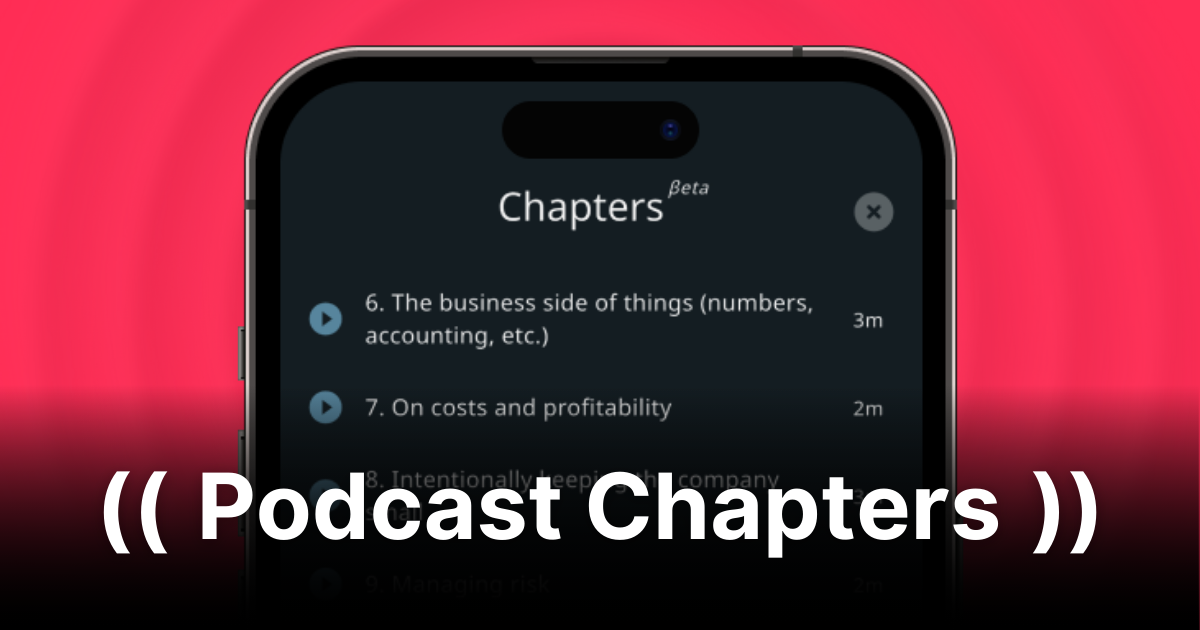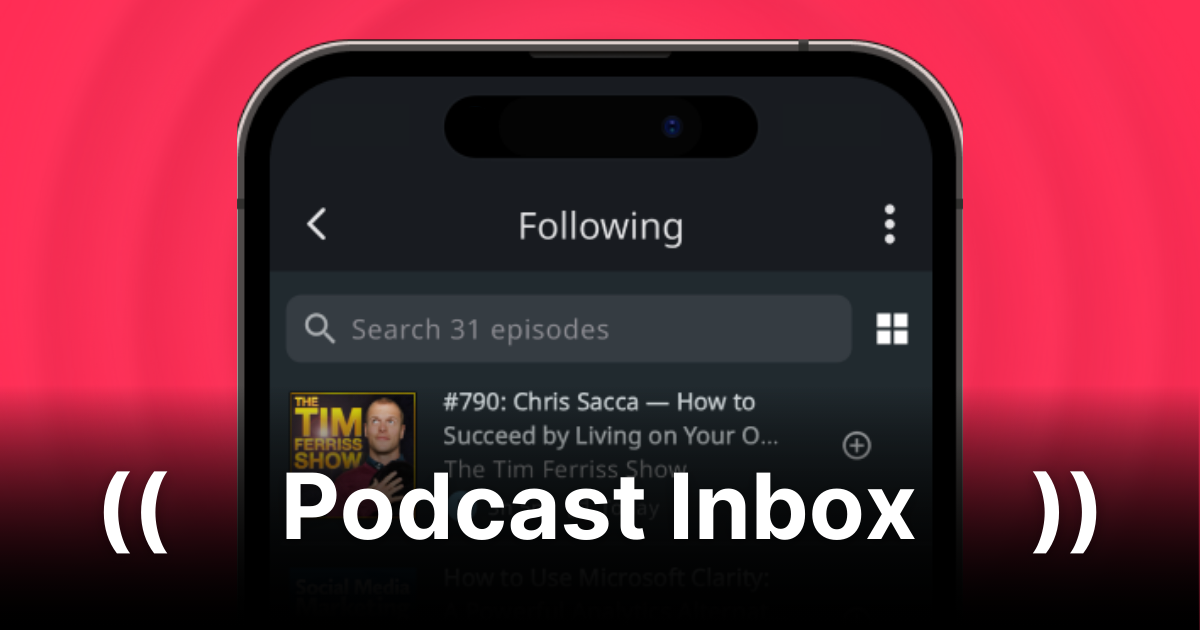Metacast: Q1 2025 Retrospective
What we've been up to this year so far — new features, marketing, spiking costs, LLM bot invasion, and DIY corporate taxes.
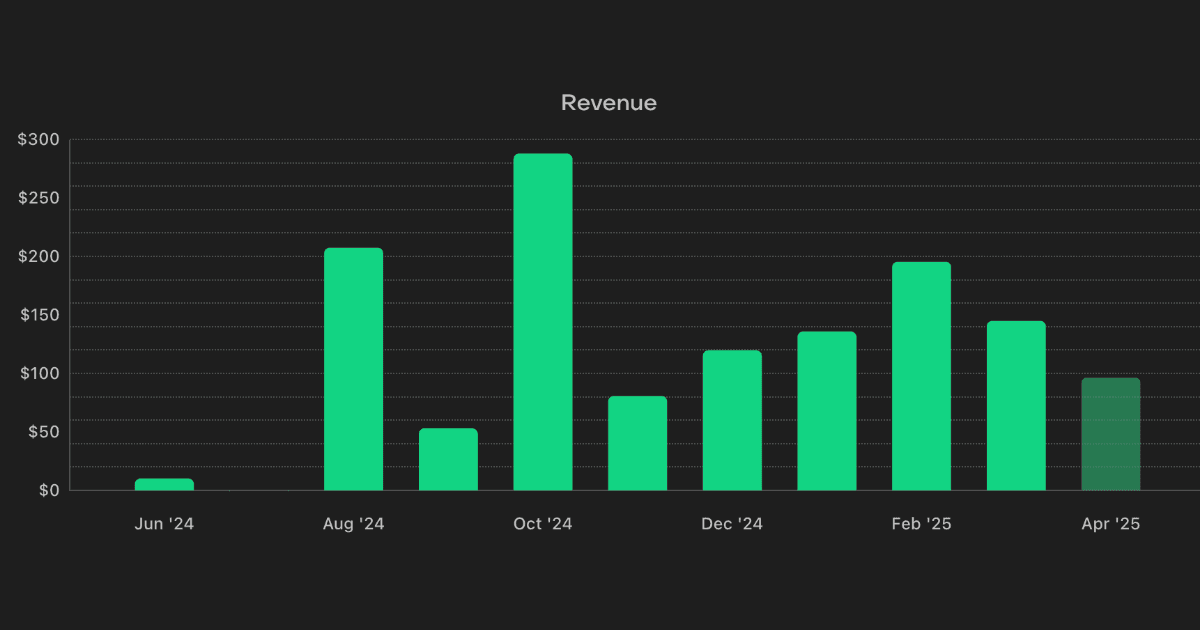
Table of Contents
Status: Q1 2025
In Q1 2025, the growth of our podcast app Metacast was steady, but not crazy.
As of this post's publication, our MRR is $134/mo with 500+ active users and 87 Premium subscriptions. In total, we've made $1,328 since we enabled monetization.

At any moment in time, we have ~20 active trials with about 50% converting to paid subscribers. Our biggest challenge right now is distribution — growing the top of the funnel to get more users to download and try the app.
We've written a separate post about distribution challenges. If you can help us figure it out, please reach out.
Note: We also talked about Q1 on episode 68 of our Metacast: Behind the scenes podcast.
Focus areas in Q1
Our focus areas for Q1 2025 were:
- Improve the mobile app to make it more attractive for an average listener who wants a really good podcast player.
- "Secret sauce" features to add unique value and differentiate Metacast from the incumbents.
- Improve the web app to attract more users at the top of the funnel.
- Expand our reach with SEO and marketing.
We also had distractions that slowed our down:
- After Jennie's departure we had to regroup and work differently.
- Our costs started to grow faster than they should've, so we had to put some effort into optimizing them.
- Taxes are never fun, but we had to do what we had to do.
Focus 1: Improving the mobile app
We want to offer the most powerful yet simple and intuitive podcast app out there. The really good podcast app.
In other words, migrating to Metacast should be a no-brainer if you're already paying for another independent podcast app. We've been listening to our users and have prioritized features that both bring us close to the competition and make us stand out.
Chapters
You can now see a table of contents, quickly skip long intros and ads, and jump to interesting sections with the new chapters feature. We do chapters better than any other podcast app we tried. Our users noticed and really love the feature.
The new chapters feature is dope. I don’t listen to that much long podcasts, but I do listen to All-In regularly. I used to listen to the full episode, but been listening less and less. The chapters thing helps out quite a bit to jump to the bits that I find interesting.
– Guang Yang, co-host of Software Misadventures podcast
Learn more about chapters in our blog post.
P.S. We're polishing up the UI and will ship exciting new improvements in v1.18 (mid-April 2025). Stay tuned!
Podcast Inbox
You can now triage new episodes for your podcast in batches with the Podcast Inbox a.k.a. the "Following" playlist.
New episodes from all podcasts you follow are added to the Following playlist automatically. You can skim through the list at your own pace, add the episodes you're interested in to Listen Later, and clear the playlist with a tap of a button when you're done.
Don't worry about being overwhelmed by an ever-growing inbox. Episodes are stored in the Following playlist only for two weeks, so it never becomes too large.
Learn more about triaging podcast episodes in our blog post.
Minor things
- Run Metacast on a Mac. We've enabled the app to run on a Mac (install via the MacOS App Store) and seamlessly work via the iPhone Mirroring tool.
- Updated colors. The app now has deeper, darker colors.
Focus 2: Improving the web app
We've invested a lot of effort into improving our web app.
Transcripts for 100k+ episodes
The web app now shows transcripts for any episode that has either a creator-provided transcript (via RSS feed) or an AI-generated transcript. Transcripts on the web are really helpful if you want to search for specific keywords, share a quote, or analyze the text with an LLM.
When creators provide speaker names and their pictures, our web app will show them as well. See this episode from The Panel podcast for an example.
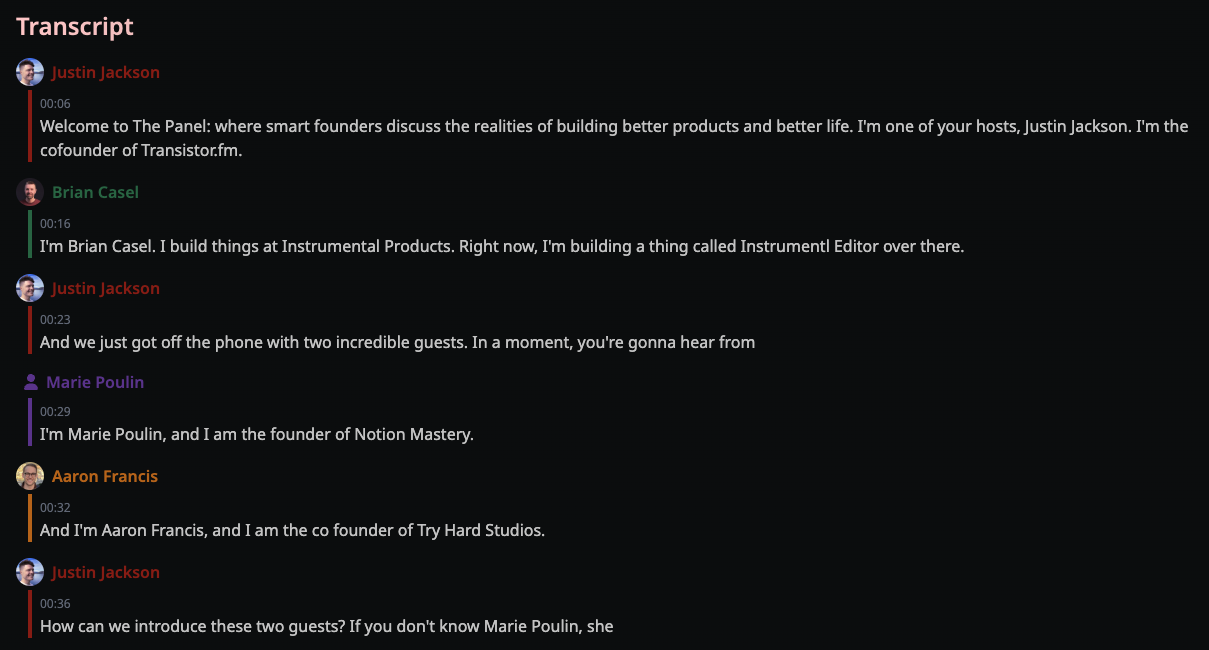
For creators: We support transcripts in all main formats — JSON, WebVTT, SRT, and even HTML and plain text. We can't wait to also support these transcripts in the mobile app. This is coming soon-ish.
AI-generated summaries
You can now see AI-generated summaries for some episodes. This is useful when the episode description is too long, too generic, or missing altogether. This feature is coming to the mobile app soon too!
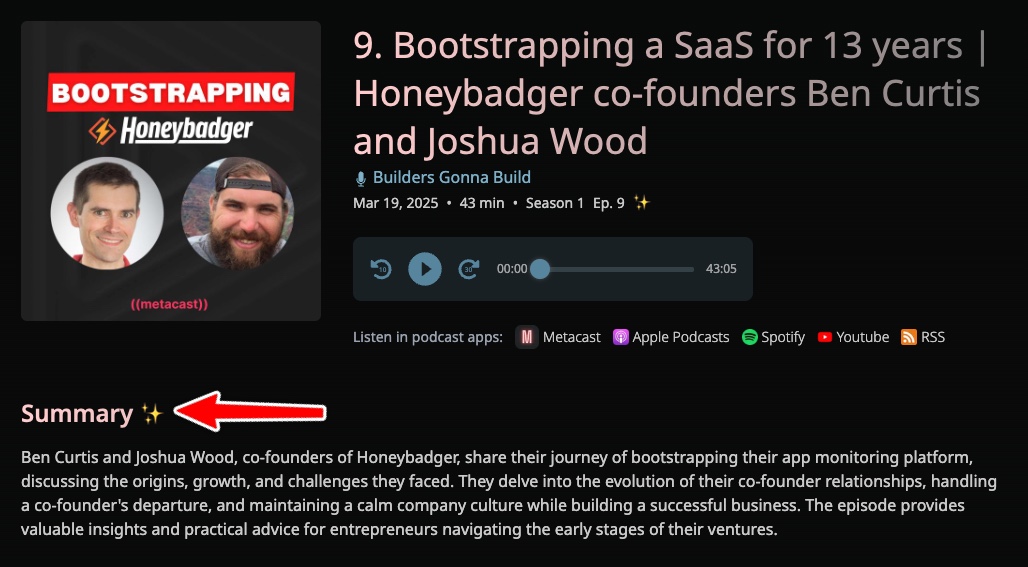
New share images
We've upgraded the design of the share images. When you share a link from Metacast on social media or in chat, the images look slick with the blurry backdrop around the artwork.
Try it yourself by sharing a link on social media or in a messaging app.
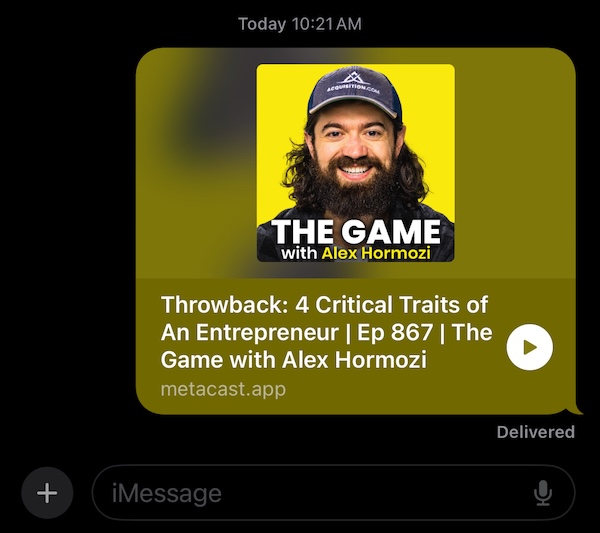
Minor things
- Audio player. You can now play episodes directly in the web app.
- Light theme. If being blinded by a white background is your kind of thing, we got you covered! (just kidding) The default theme is still dark, but you can toggle it to light at the top of the web site.
- Change Log. We've added the change log for the mobile app on the website. You can see what we shipped and when here.
Focus 3: Expanding the reach
In the annual retrospective blog post, I wrote that that I dropped the ball on a lot of the marketing activities. In Q1, we've been digging ourselves out and restarting our marketing.
SEO
In Q1, we've doubled down on the content on our website to get more reach via organic SEO.
- We've added tons of search engine optimizations. Our impressions and clicks grew 12x in three months.
- We've re-done our content publishing stack. We used to publish blogs with Outstatic, but it was incompatible with my style of writing content (I want to author locally on a branch whereas Outstatic pushed directly to main). So, I didn't write much. We built a custom pipeline and started publishing more posts thanks to the removed friction — 7 blog posts in Q1 vs. 5 posts in the entire last year!
Podcasts
We re-started our Builders Gonna Build podcast with an interview with Honeybadger co-founders Ben Curtis and Joshua Wood. It feels nice to be back!
We'd not recorded anything for almost a year, partially because we didn't see it move the needle much. This time, we're approaching it differently.
- Pragmatic approach to guests. We decided to only invite people who have an audience of their own or, on the contrary, are not very public but sought after, so we can get people interested in the content. If you know someone who might be a good fit (or you're that person!), please reach out to us.
- Derivative moments. We use interviews to produce short-but-not-too-short derivative content, which we call "moments." We stole the idea from The Diary of a CEO podcast. We've published a couple of moments in our podcast feed and on YouTube. It's yet to be seen if it'll help the reach, but it's an experiment worth trying.
- Quality over quantity. We will record as we sign up good guests. We will not stick to a specific schedule.
P.S. Check out the new episode: Bootstrapping a SaaS for 13 years.
P.P.S We'll continue to regularly publish our Metacast: Behind the scenes podcast too!
Newsletter
Since we're now writing a lot more content on our blog, might as well send it out via a newsletter. Sign up to our Substack at metacastpodcast.com if you haven't already.
Guesting on podcasts
Our target customers listen to podcasts (obviously!), so we are trying to get onto other people's podcasts.
- Arnab guested on John Cricket's Coding Chats where he talked about career growth, mentoring, and the despair of senior roles. The full interview is here.
- Both of us guested on DeepCast.fm's upcoming podcast. It's not released yet.
- I was a guest on Bytes in Balance where we talked about gaming and social media addictions. The full episode is here.
If you have a tech, product management, or podcasting-related podcast, reach out to us at [email protected]. We'll be happy to be guests on your show if we can add value to your listeners.
Distractions and setbacks
Jennie leaving the company
We used to be three people, now we're down to just Arnab and me.
We adjusted to the reduced capacity by siloing and reducing the code review overhead. Here's how it panned out:
- Mobile app has a single owner. Arnab is the only one doing the Flutter development right now. He pushes code without review. We collaborate on the UX, both asynchronously and in real time.
- Web app has a single owner. You guessed it. I push code without review.
- Backend is a 50/50 split. Our backend is subservient to the apps, so whenever we need a change, the person who needs it more does it. We are more diligent about backend changes, because there's room to screw up a lot of data. I usually don't push code without a review unless it's a super simple change.
Overall, this has worked well.
Spiking costs
We got a couple of thousand dollars worth of Google Cloud credits with their startups program, so we weren't paying much attention to the costs. Our bill had always been $0.
However, at some point, we noticed that the credits may run out if we do nothing, so we starting digging.
It turned out, some of our workflows weren't optimal and we were generating a lot of writes to Firestore, which in turn triggered a lot of writes to BigQuery. We use BigQuery for analytics and each query against a bigger table would cost us a dollar, because the query had to scan hundreds of gigabytes of data.
Also, our logging was too noisy and it was getting expensive. And we had too many unnecessary function invocations.
We did some targeted re-architecture to optimize the backend, then we had to rebuild the BigQuery schema, backfill the data, etc. It took a lot of effort (2-3 weeks total) that we could've otherwise spent building features.
This drastically reduced our costs, and it was a great lesson learned. We may do a writeup about it in a separate blog post.

LLM bots invasion
In February, we noticed something strange — our web app costs on Vercel were going out of control. It turned out that we were hit by tens of thousands of requests by LLM bots from Anthropic and Amazon.
It was another distraction from feature development, because we had to do some changes to the web app that we described in a detailed blog post — LLM bots + Next.js image optimization = recipe for bankruptcy (post-mortem).
It's a cautionary tale for startups running in the cloud. Always set spend limits if you don't want to go broke!
We learned a ton while dealing with bots. The story keeps developing and distracting us. The pace of crawling has accelerated — as of April 2025, we have ~300k requests daily!
It's mostly bot traffic.

We are choosing to not block the bots in hopes that we may benefit from mentions and linking from AI agents.
However, our costs are growing again. In April, we'll need to invest more time to implement better caching with Cloudflare. We'll write this up in a separate blog post.
Taxes
This year we decided to do corporate taxes ourselves. The whole thing took a couple of days, but the mental overhead of procrastinating felt like it took the entire quarter.
We wrote a blog post about the process of filing Form-1120 for a C-Corp, FL-1120, Delaware Franchise Tax, and Florida annual report.
Focus for Q2
We've not yet figured out if/how we should share our roadmap publicly, so here are our directional goals for Q2.
Product & engineering goals
- Complete "table stakes" features. We need to close the gap with the competitors on the basic functionality. We'll add support for private podcasts and custom playlists.
- Differentiating capabilities. This is our secret sauce, so we won't disclose more than necessary ahead of time. Exciting stuff is coming!
- Web app. We'll keep improving the web app, so it becomes a viable companion to the mobile apps. We also need to implement more aggressive caching to keep costs under control.
Growth goals
- Figure out how to get users to invite their friends. We need to grow our user base with people similar to those already paying for the app.
- Top of the funnel optimization. As we start getting more and more traffic onto our website, we need to make sure we actually capture new users from it.
- In-app onboarding. I'll just say that we can do a better job to increase the conversion rate.
- Figure out App Store "SEO". We're too low for the "podcast app" search in App Store. This needs to change.
- Grow ratings and reviews. We need to add a trigger in the app and find other ways to encourage users to rate the app.
How can you help?
- Download Metacast for free on Apple App Store or Google Play Store.
- Please give us a rating in the App Store or Play Store. It helps a ton!
- Recommend Metacast to people you know.
- Support us by buying the Premium subscription ☺️
